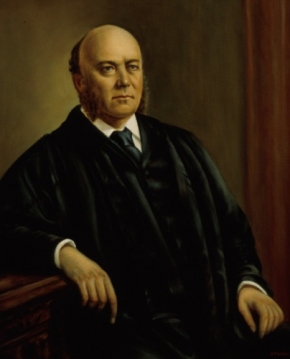You are here
Circuit Court Opinions:
Associate Justice Horace Gray, American Bell Telephone Co. v. Dolbear (1883)

American Bell Telephone Co. v. Dolbear, 15 F. 448 (C.C.D. Mass. 1883) [First Circuit], affirmed, 126 U.S. 1 (1888)
As the inventor of the telephone, Alexander Graham Bell and his company brought several patent infringement cases in the federal courts. The defendant in Dolbear did not deny that Bell developed the first telephone but, having developed a telephone that worked in a slightly different manner, disputed the scope of Bell’s patent.
In his opinion, Justice Gray acknowledged the well-settled rule that “you cannot patent a principle.” Thus, neither Bell nor anyone else could hold a patent for the idea that speech could be transmitted by electrical means. Bell held a patent much more concrete and specific than an idea, but broader in scope than the precise design of his telephone. As Gray explained, Bell’s patent was “not limited to a particular form of apparatus, but includes the process or method … the essential elements of which are ‘the production of what the patent calls undulatory vibrations of electricity to correspond with those of the air, and transmitting them to a receiving instrument capable of echoing them.’”
Despite the small differences in Dolbear’s equipment and process, “the facts remain that they avail themselves of Bell’s discovery,” Gray concluded. Finding that the defendant had infringed the patent, Gray issued a temporary injunction which, after a further hearing, was converted to a permanent injunction. The Supreme Court heard the case along with several others, collectively known as The Telephone Cases, and affirmed the judgment in 1888.
